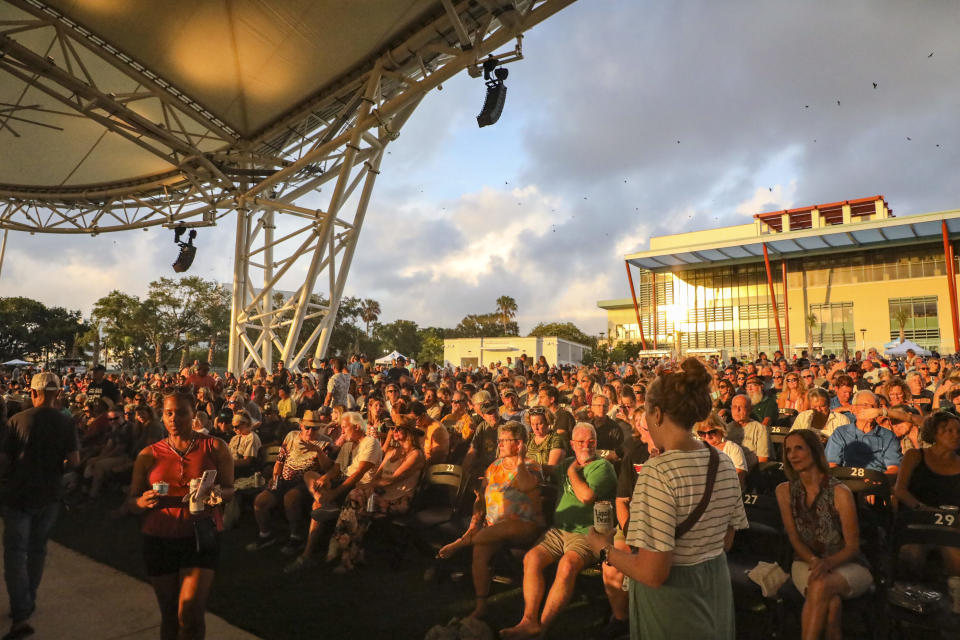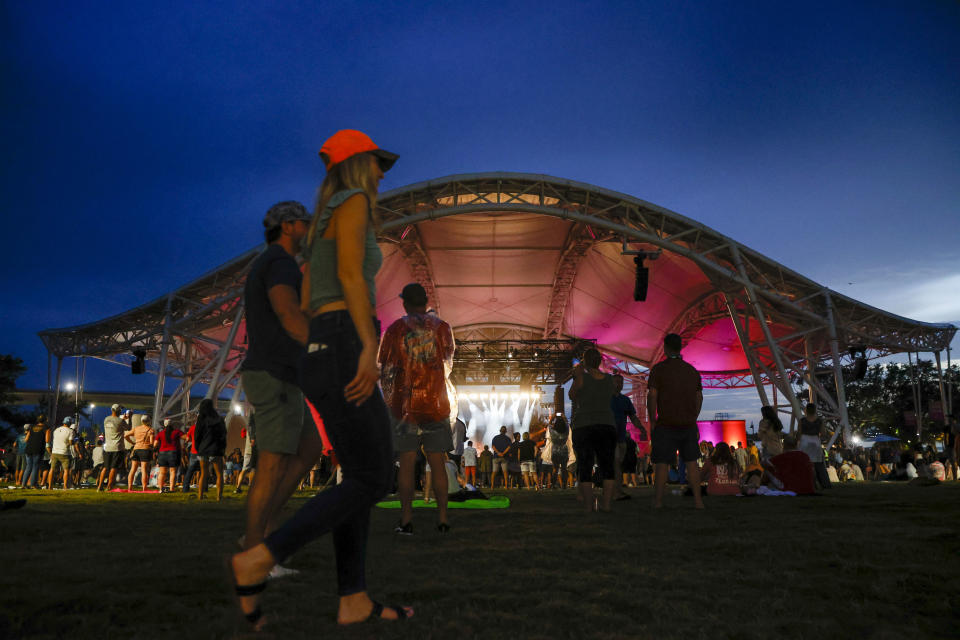Clearwater’s new venue The Sound is 6 months old. How’s it going?
Clearwater City Council member Lina Teixeira choked up when she saw a group of people in their 20s wearing cowboy boots as they walked to join thousands at a concert in Coachman Park on a recent Thursday night.
“That’s something that would have been impossible for downtown a year ago,” she said.
The concertgoers were headed to The Sound, the city’s signature waterfront amphitheater, with 4,000 seats under a canopy and lawn space for another 5,000. Opened in late June, the venue is the centerpiece of an $84 million revitalization of Coachman Park, a 19-acre gathering space featuring a playground, splash pad, plaza and promenade along Clearwater Harbor.
The hope was to bring more visitors to the struggling downtown with concerts organized and run by Ruth Eckerd Hall. The performing arts nonprofit has put on 17 ticketed shows that attracted nearly 70,000 people in its first six months, not including nine events for other organizations, according to data provided by Ruth Eckerd.
But city and Ruth Eckerd officials are still working out the logistics of operating an amphitheater inside of a community park — and how to manage each other’s expectations.
“It’s like a marriage,” said parks and recreation director Art Kader. “We’re getting to know one another and we’re making adjustments.”
One of the first adjustments that will be requested by the city is more financial transparency about the venue’s bottom line.
Ruth Eckerd is financially responsible for all operations of the venue, like booking acts, marketing, security, maintenance and food and beverage. The contract does not guarantee the city will make money on the amphitheater, but it includes a provision giving the city a portion of each ticket sold. And once The Sound’s operations generate a profit margin of 8% or higher, Ruth Eckerd will also share 25% of annual profits with the city.
But the contract the City Council approved in December 2022 does not require the nonprofit to submit revenues and expenditures of The Sound to the city or the public in writing. Instead it states that, once a year in January, Ruth Eckerd will allow a city designee to inspect financial information from the previous year to confirm calculations for the ticket rebate and profit share.
Assistant City Manager Michael Delk said negotiations are under way for a change that would allow the officials to review The Sound’s financial records more frequently so the city can better plan. The council is expected to review the proposed contract amendment early next year.
“Hindsight being what it is and the nature of the concerts unfolding, we’d like to have a little more regular updates on where things stand with revenues and projections,” Delk said.
Susan Crockett, CEO of Ruth Eckerd, said in an interview that the organization requested the data-sharing terms for proprietary and industry competition reasons. She offered that the venue in its first six months has broken even financially.
She expects profit sharing with the city to begin in year five. However, projections submitted to the city before the venue’s opening showed Ruth Eckerd expected profit sharing to begin in the third year.
The first 11 shows from June 30 through September sold a total of 36,006 tickets, according to the most recent quarterly rebate reports available.
Through the ticket rebate agreement, the city received $167,706 for those 11 shows in its first three months of operating.
The contract requires Ruth Eckerd to report the number of tickets sold per quarter and not the total for each show. Although the attendance averaged 3,273 per show, Crockett said she has been satisfied with turnout.
Most of the acts booked to date had ticket capacity capped to remain under the canopy, she said. Whether the shows have lawn tickets made available to seat the full 9,000 depends on the artist, Crockett said.
“We’ve been pretty happy with what we’re seeing in terms of the attendance,” Crockett said.
Delk said he could not answer whether the attendance to date is what he expected. He said the city is not in the music promotion business so has less of a gauge of how many shows should or will be opened to the lawn space.
But it is part of the reason the city wants better access to The Sound’s finances.
“Increasing that just allows us to track more efficiently,” Delk said, “and then you can plan more efficiently and see where things stand.”
Delk said the contract change also would likely include some logistical updates due to lessons learned in the first six months. When the city opened the venue, the expectation was for Ruth Eckerd to remove chairs under the canopy between shows so the public visiting Coachman Park could walk through the area.
But Crockett said that task has proven expensive and logistically challenging. It can cost $4,600 for labor to set up tables, tents, chairs, fencing and get it all out by the next morning, she said. Depending on the show schedule, the organization would have to do it all over again soon after.
As a result, the sides are also discussing new contract terms that will not require Ruth Eckerd to dissemble the seats between every show. Delk suggested that making it easier for the public to roam near the venue’s expensive equipment may not have been the best idea to start with.


